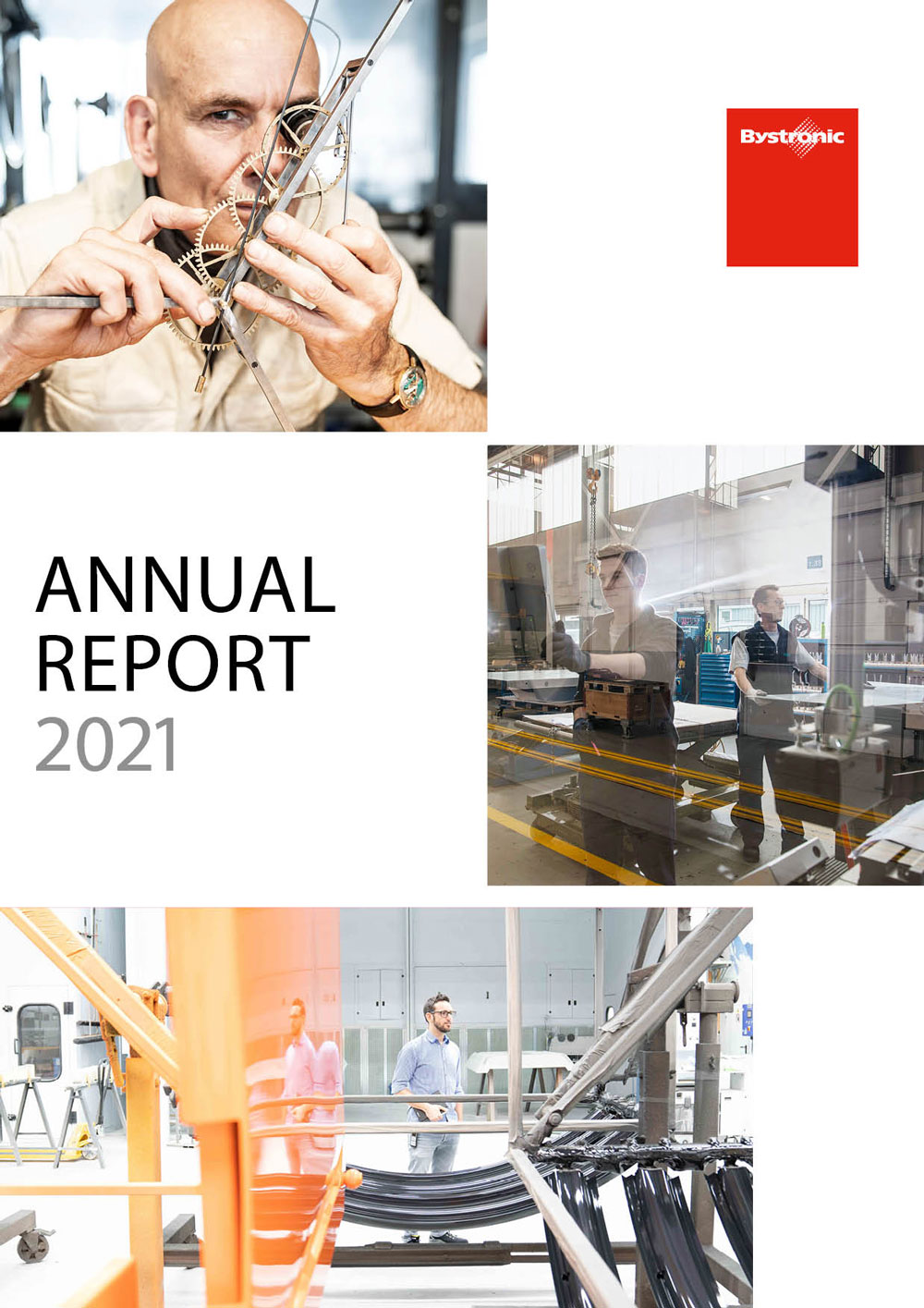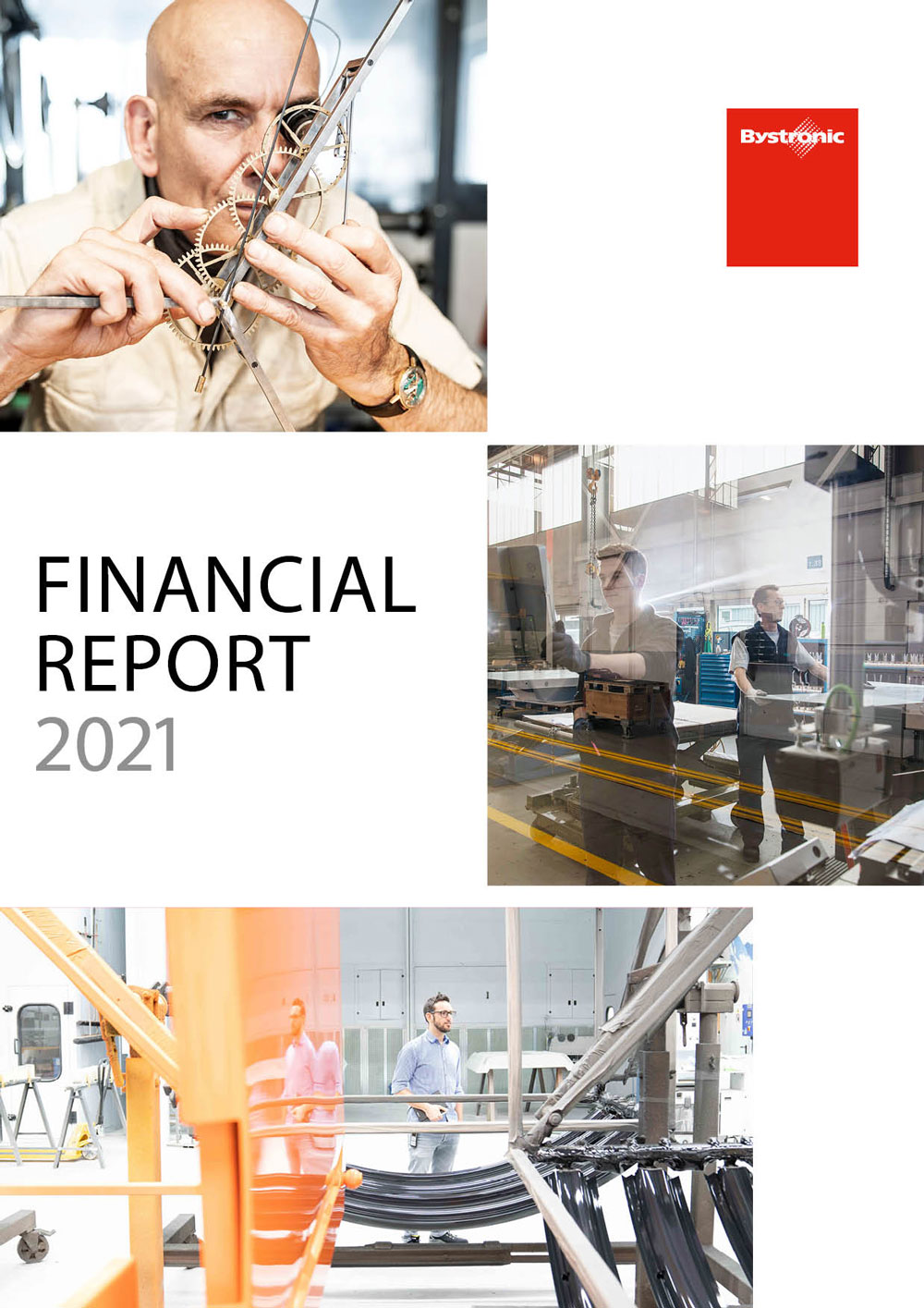3 Board of Directors
3.1 Members of the Board of Directors
According to Art. 14 of the Articles of Association, the Board of Directors of Bystronic AG consists of between five and eight members. On December 31, 2021, it was composed of the following seven members:
|
Name |
Function on the Board of Directors |
|
Function on the Audit Committee |
|
Function on the Human Resources Committee |
|
Year of appointment |
|
|
|
|
|
|
|
|
|
|
|
|
Ernst Bärtschi |
Chairman |
|
|
|
|
|
2014 |
|
|
Jacob Schmidheiny |
Member (from 1984 to 2014: Chairman) |
|
|
|
|
|
1977 |
|
|
Dr. Matthias Auer |
Member |
|
Member |
|
|
|
1996 |
|
|
Robert F. Spoerry |
Member |
|
|
|
Member |
|
1996 |
|
|
Dr. Roland Abt |
Member |
|
Chairman |
|
|
|
2014 |
|
|
Urs Riedener |
Member |
|
|
|
Chairman |
|
2014 |
|
|
Dr. Heinz O. Baumgartner |
Member |
|
|
|
Member |
|
2021 |
|
On November 8, 2021, Bystronic AG announced that Ernst Bärtschi will step down from the Board of Directors with effect from the date of the 2022 Annual General Meeting.
The Board of Directors nominates Dr. Heinz O. Baumgartner for election as the new Chairman by the shareholders at the Annual General Meeting in April 2022. In addition, the Board of Directors nominates Inge Delobelle for election as a new member of the Board.
3.2 Curriculum vitae, other activities and vested interests

Ernst Bärtschi
lic. oec. HSG, born in 1952, a Swiss national, has been a member of the Advisory Board of the private equity investor CRCI (China) since 2012. In 2002, he joined Sika AG, Baar, where he worked as Chief Financial Officer until 2004 and as Chief Executive Officer between 2005 and 2011. After working at Nestlé, Vevey, Ernst Bärtschi occupied various management positions at the Schindler Group, Ebikon, between 1980 and 2002, including as Managing Director of Schindler Switzerland and Chief Financial Officer of the Schindler Group.

Dr. Matthias Auer
Dr. iur., born in 1953, a Swiss national, has worked as independent attorney and notary public in Glarus since 1981. He is also Vice-Chairman of the Board of the Migros Zurich Cooperative.

Urs Riedener
lic. oec. HSG, born in 1965, a Swiss national, has been Chief Executive Officer at Emmi, Lucerne, since 2008. Until 2008, he headed the marketing department and was a member of the General Directorate of the Federation of Migros Cooperatives MGB in Zurich. From 1995 until 2000, he worked for the Lindt & Sprüngli Group, Kilchberg, in various management roles in Switzerland and abroad. He started his career working in various positions at Kraft Jacobs Suchard. Urs Riedener is also a member of the Board of Promarca (Swiss Association of Brand Articles), a member of the Board of the Swiss Management Association (SMG), and a member of the Executive Committee of the Institute for Marketing at the University of St. Gallen.

Dr. Heinz O. Baumgartner
Dr. oec. HSG, born in 1963, a Swiss national, has been Chief Executive Officer of Schweiter Technologies since 2008 and a member of its Board of Directors since 2020. From 1996 to 2013, he was Chief Financial Officer of Schweiter Technologies. From 1992 to 1995, he was controller at Asea Brown Boveri Switzerland. Heinz O. Baumgartner is a member of the Board of Directors of the United Grinding Group.

Dr. Roland Abt
Dr. oec. HSG, born in 1957, a Swiss national, is a member of the Board of Directors of Swisscom AG, Berne, and Chairman of the Board of Directors of Aargau Verkehr AG (AVA), Aarau. Previously, between 2004 and 2017, he was Chief Financial Officer of Georg Fischer Ltd., Schaffhausen, which he joined in 1996, initially as Chief Financial Officer of the Agie Charmilles Group (1997 to 2004). He held various positions at the Eternit Group in Switzerland and in Venezuela (1987 to 1996).

Jacob Schmidheiny
lic. oec. publ., born in 1943, a Swiss national, has been a member of the Board of Directors of Bystronic AG (previously Zürcher Ziegeleien and Conzzeta AG) since 1977, which he chaired between 1984 and 2014. In 1976, he was appointed to the Executive Committee of Zürcher Ziegeleien. He was Chairman of the Executive Committee from 1978 until 2001. Under the leadership of Jacob Schmidheiny, the group transformed from a supplier of construction materials into an industrial holding company.

Robert F. Spoerry
Dipl. Masch.-Ing. ETH, MBA, born in 1955, a Swiss national, is Chairman of the Board of Directors of Mettler-Toledo International Inc., Greifensee, which he also headed as CEO from 1993 to 2007, and of Sonova Holding Ltd., Stäfa.

Inge Delobelle
Inge Delobelle is nominated by the Board of Directors as a new member of the Board of Directors for election at the Annual General Meeting in April 2022.
Inge Delobelle, lic. oec. KU Leuven, born in 1969, a Belgian national, has been Chief Executive Officer of the BU Europe Africa at TK Elevator GmbH, Düsseldorf, since 2018. She joined the ThyssenKrupp Group in 2001 and held various management positions in the services, steel, and elevator divisions. Among other things, as CFO and later CEO, she was responsible for the steel service activities of TK Service Acier, France, and the global access solutions business of TK Elevator. Prior to 2001, she was an investment banking consultant with the Metzler private bank, Frankfurt, for seven years.
No member of the Board of Directors has worked in an executive role for Bystronic within the last four years and no member and no enterprise or organization represented by the members has any significant business relationship with the group – other than in the status as a shareholder (see Financial Report, Notes to the Financial Statements of Bystronic AG).
When filling future vacancies, attention will continue to be paid to ensuring that the Board has a diverse composition in terms of experience, industry know-how, geographical origin and gender.
3.3 Rules contained in the Articles of Association relating to the number of permitted activities under Art. 12 para. 1 sec. 1 OaEC1
According to Art. 28 of the Articles of Association of the company, no member of the Board of Directors may accept more than ten additional mandates, including no more than four in listed companies. This restriction does not apply to:
- mandates in companies controlled by the company or that control the company;
- mandates taken up by a member of the Board of Directors on the instructions of the company. No member of the Board of Directors may accept more than ten such appointments; and
- mandates in associations, charitable foundations and pension foundations. No member of the Board of Directors may accept more than ten such appointments.
Mandates are understood to be appointments to the highest management body of a legal entity that are subject to registration in the Commercial Register or an equivalent foreign register. Mandates in different legal entities under joint control or with the same economic beneficiary are regarded as a single mandate.
- Ordinance against Excessive Remuneration in Listed Companies Limited by Shares.
3.4 Elections and terms of office
The date of first election to the Board of Directors of each member is listed in the table under Section 3.1 “Members of the Board of Directors”. There are no limitations on the term of office. The Articles of Association do not contain any rules concerning the appointment of the Chairman, the members of the Compensation Committee and the independent proxy that deviate from those prescribed by law.
3.5 Organization and definition of areas of responsibility
The powers and tasks of the Board of Directors are determined by law and the Articles of Association along with the Organizational Regulations of Bystronic AG. The Articles of Association and the Organizational Regulations of Bystronic AG can be found on the companyʼs website, the latter not including the annexes.
Board of Directors
The Board of Directors of Bystronic AG bears responsibility for the overall management, supervision and control of the group and its management, and it monitors compliance with the applicable legal provisions. It decides on the strategic targets of the group and the financial and human resources necessary in order to achieve the targets. In doing so, the Board reviews the strategy and targets, particularly in the context of Bystronic’s sustainability endeavors. In addition, the Board of Directors determines the values and standards of the group and ensures that the duties towards shareholders and other stakeholders are complied with. Specifically, the Board of Directors is vested with the following tasks in particular:
- Overall management of the company and the setting of targets relating to corporate policy and culture; approval of the group strategy and the strategic priorities of the individual business units;
- Approval of the strategic and financial targets of the group and the business units;
- Risk assessment for the group;
- Decisions on the creation of new business units or the discontinuation of existing business units; approval of significant acquisitions, mergers, sales, or individual projects;
- Adoption of resolutions relating to contracts under which Bystronic AG acts as a party to mergers, spin-offs, transformations, or transfers of assets under the Mergers Act;
- The structuring of the accounting, financial control and financial planning for the group and the business units, and the structuring of a comprehensive reporting system in line with the strategy;
- Approval of the applicable accounting standards, the framework conditions for financial control and the internal control system along with any significant changes to the same;
- Annual assessment and approval of the budget and the strategic financial planning;
- Review and approval of the (Annual and Half-Year) Financial Statements and reporting;
- Compilation of the Annual Report and the Compensation Report;
- Notification of the court in the event of overindebtedness;
- Assessment of liquidity with reference to the group objectives;
- Determination of the organization and the issuance of Organizational Regulations for the group;
- Review and approval of management principles, group guidelines, and the group management structure;
- Overall supervision of the persons entrusted with managing the company, including with regard to compliance with laws, the Articles of Association, and regulations and the implementation of the resolutions of the Board of Directors and of the General Meeting;
- Appointment and dismissal of members of the Executive Committee;
- Calling of Annual General Meetings and extraordinary General Meetings;
- Adoption of resolutions on proposals presented to shareholders;
- Implementation of resolutions adopted by shareholders.
On the basis of the Organizational Regulations, the Board of Directors has delegated the operational management of business to the Executive Committee under the leadership of the CEO. The members of the Executive Committee are responsible for the comprehensive operational management of their fields. They manage them in accordance with the strategy approved by the Board of Directors, the strategic financial planning, and the annual budget.
Important transactions that exceed a certain financial threshold must be presented to the Board of Directors in advance for approval, such as in particular decisions concerning the incorporation or sale of subsidiaries, the acquisition or sale of equity interests, restructuring projects, investments, acquisitions, divestments, the purchase and sale of real estate, the conclusion of rental agreements and leases, consultancy contracts, cooperations and strategic partnerships, major projects (e.g. in the field of IT, development, organization), and financial obligations, the threshold values for which lie between CHF 3 and 10 million, depending on the transaction.
The Board of Directors is authorized to pass resolutions on all matters not delegated or reserved to the General Meeting.
The Board of Directors convenes as often as business requires, but on no less than five times a year. The CEO, the CFO, and the General Counsel, who also serves as the Secretary to the Board of Directors, are included in meetings of the Board of Directors, unless decided otherwise by the Board of Directors in relation to individual agenda items. In addition, members of the Executive Committee, the Extended Executive Committee, and other executives, as well as, on an occasional basis, external consultants are consulted on specific topics. In the reporting year, representatives of external consultants were invited to two meetings.
Chairman of the Board of Directors
The Chairman of the Board of Directors is elected by the Annual General Meeting. He coordinates the work of the Board of Directors, issues invitations to the meetings of the Board of Directors, determines the agenda, prepares the meetings together with the CEO, and chairs the meetings. He monitors the implementation of resolutions of the Board of Directors and the General Meeting.
Cooperation between the Board of Directors and its Committees
The Board of Directors may establish committees, unless such a right is vested by law in the General Meeting. It has established an Audit Committee with tasks relating to finances and auditing and a Human Resources Committee with tasks relating to personnel and remuneration. In 2019, when the strategic realignment was decided, it temporarily created three additional committees, one each for the FoamPartner, Mammut, and Bystronic business units. Following the successful sale of the FoamPartner and Mammut business units, these three committees were dissolved, since from this point, the Board of Directors was able to concentrate fully on the continuing operations of the Bystronic business unit.
Subject to legal provisions, the Board of Directors determines the duties of the committees. The overall responsibility for the tasks transferred to the committees remains with the Board of Directors. However, if the Board of Directors has granted a committee decision-making powers in areas that lie outside the non-transferable powers of the Board of Directors, the committee concerned bears sole responsibility for such decisions. Ordinarily, no specific decision-making responsibilities are transferred to the committees. They thus bear responsibility for the preparation of decision-making and for the detailed examination of the matters they are to handle, and they submit proposals to the Board of Directors or inform the Board of Directors of their conclusions. The Human Resources Committee and the Audit Committee report on their activities, results, and proposals at the next Board of Directors meeting. The Board of Directors is informed immediately of important events. Minutes are taken concerning the meetings of the committees and their decisions, which are also presented to the other members of the Board of Directors.
Human Resources Committee
The Human Resources Committee consists of those members of the Compensation Committee appointed to the task in the course of the Annual General Meeting held on April 21, 2021, see Section 3.1. “Members of the Board of Directors”. As a general rule, the Chairman of the Board of Directors, the CEO, and the Chief HR Officer of the group also participate in meetings of the Human Resources Committee in an advisory capacity, albeit not when it comes to the determination of their own salaries.
In addition to the tasks outlined in a general manner in Art. 21 of Bystronic AG’s Articles of Association, the Compensation Committee, acting in its capacity as the Human Resources Committee, executes additional tasks. Its tasks, which are described in the Organizational Regulations, essentially comprise the following:
- Proposals to the Board of Directors concerning rules on the compensation of the Board of Directors and the Executive Committee;
- Examination of all remuneration as to its permissibility;
- Recommendation to the Board of Directors concerning proposals to the Annual General Meeting on remuneration;
- Proposal to the Board of Directors concerning the annual compensation of the members of the Board of Directors, the CEO, and the other members of the Executive Committee;
- Preparation of the Compensation Report and discussion of the report with the auditors; presentation of proposals to the Board of Directors;
- Assessment of share and option plans in addition to bonus plans and other performance-related compensation with regard to compliance with the relevant provisions of the Articles of Association, and the payment of variable remuneration in cash or as options and shares to members of the Board of Directors and the Executive Committee; proposals to the Board of Directors;
- Proposal to the Board of Directors concerning the definition of the principles applicable to the selection procedure for candidates for election to the Board of Directors or the Executive Committee and preparation of a candidate shortlist;
- Preparation of medium- to long-term succession planning for members of the Board of Directors and members of the Executive Committee;
- Recommendation concerning nominations of members of the Executive Committee for the attention of the Board of Directors;
- Monitoring of diversity across all management layers within the group, focusing on the promotion of female leaders on management and Executive Committee level as well as future Board mandates
- Monitoring of training and personnel development measures;
- Assessment of management staff and internal talent;
- Assessment of staff retirement benefits;
- Recommendations, if necessary, and monitoring of compliance with group objectives in relation to personnel;
- Responsibility for the rules relating to permitted external mandates of Executive Committee members; presentation of proposals to the Board of Directors.
The Human Resources Committee convenes at least twice a year.
Additional details can be found in the activity report of the Human Resources Committee (“Human Resources Committee Report”).
Audit Committee
In addition to its members (see Section 3.1 “Members of the Board of Directors”), the Chairman of the Board of Directors, the CEO, and the CFO generally also attend the meetings of the Audit Committee in an advisory capacity. Upon invitation by the Chairman, the company’s external auditors and internal auditors may also attend meetings or participate in the deliberations on individual items on the agenda. The essential tasks of the Audit Committee are described in the Organizational Regulations. They include in particular:
- Review and proposal to the Board of Directors concerning the organization of the accounting, financial control, and financial planning systems;
- Critical analysis of individual company and Group Financial Statements (Annual and Half-Year Financial Statements); discussion of these Financial Statements with the CFO and the external auditors; presentation of proposals to the Board of Directors concerning these Financial Statements;
- Assessment of the efficacy and performance of the external auditors and their fee, as well as their independence; decision regarding the granting of additional mandates to the external auditors other than the auditing mandate; preparation of the proposal of the Board of Directors to the General Meeting regarding the election of the external auditors; proposals to the Board of Directors concerning the structure of the auditing mandate; assessment of the reports of the external auditors (in particular of the audit report and the comprehensive report pursuant to Art. 728b CO) and the discussion of these reports with the external auditors;
- Assessment of the functional capability of the internal control system, taking account of risk management, compliance, and internal auditing; deliberation and definition of the audit program for the internal auditors; acceptance of reports from internal auditors and deliberation of these reports with the internal auditors; reporting to the Board of Directors;
- Approval of the method used for assessing acquisitions within the group and individual assessment of major acquisitions for the attention of the Board of Directors;
- Assessment of pension plans and the associated risks;
- Assessment of further group solutions relating to finance, such as treasury, taxation, and dividend payments by the direct subsidiaries of Bystronic AG, etc.;
- Assessment of initiatives by the Board of Directors relating to finance and accounting such as the achievement of specific financial targets and key performance indicators (KPI); reporting to the Board of Directors on the fulfillment of targets.
The Audit Committee meets upon invitation by its Chairman as often as required by business, but no less than three times a year. At its meetings, it deliberates, among other things, any annually recurring issues in accordance with the description of tasks provided above and on the basis of a standard agenda. Additional details can be found in the “Report of the Audit Committee”, which precedes the Corporate Governance Report.
Meetings of the Board of Directors and attendance
The Board of Directors and its committees hold regular meetings. These can be supplemented by additional meetings (in person or via video/telephone conference call). The meetings of the Board of Directors are called by the Chairman or at the request of a member of the Board of Directors. An outline of the various agenda items for each meeting is sent to all members in advance so that they can consider the matters to be discussed prior to the meeting.
As a general principle, the meetings of the Board of Directors include a closed session excluding the CEO and CFO or any other persons. Minutes of the Board of Directors’ deliberations and the adopted resolutions are kept in writing.
The following table shows the number of meetings of the Board of Directors and its regular committees held in 2021, the average duration of the meetings, and the attendance of the individual members of the Board of Directors.
|
|
Prior to the 2021 AGM |
|
|
|
After the 2021 AGM |
|
|
|
|
|
Meetings of the Board of Directors and attendance |
Meeting |
Telephone Conference |
Audit Committee |
Human Resources Committee |
Meeting |
Telephone Conference |
Audit Committee |
Human Resources Committee |
|
|
|
|
|
|
|
|
|
|
|
|
|
Average duration (hours) |
8.0 |
0.5 |
4.0 |
3.0 |
8.75 |
- |
3.25 |
3.0 |
|
|
Number of meetings |
1 |
1 |
1 |
2 |
4 |
- |
3 |
4 |
|
|
Attended meetings |
|
|
|
|
|
|
|
|
|
|
Ernst Bärtschi |
1 |
1 |
1 |
2 |
4 |
- |
3 |
4 |
|
|
Jacob Schmidheiny |
1 |
1 |
- |
- |
4 |
- |
- |
- |
|
|
Dr. Matthias Auer |
1 |
1 |
1 |
- |
4 |
- |
3 |
- |
|
|
Robert F. Spoerry |
1 |
1 |
- |
2 |
4 |
- |
- |
4 |
|
|
Philip Mosimann 1 |
1 |
1 |
- |
2 |
- |
- |
- |
- |
|
|
Dr. Roland Abt |
1 |
1 |
1 |
- |
4 |
- |
3 |
- |
|
|
Urs Riedener |
1 |
1 |
- |
2 |
4 |
- |
- |
4 |
|
|
Michael König 1 |
1 |
1 |
- |
- |
- |
- |
- |
- |
|
|
Dr. Heinz O. Baumgartner 2 |
- |
- |
- |
- |
4 |
- |
- |
4 |
|
1 Philip Mosimann and Michael König stepped down from the Board of Directors in April 2021.
2 Heinz O. Baumgartner was elected to the Board of Directors for the first time at the Annual General Meeting in April 2021.
3.6 Information and control tools vis-à-vis the Executive Committee
Bystronic has a sophisticated planning and information system. It is built from the bottom up with increasing consolidation.
The Board of Directors is informed in writing and orally of the strategies, plans, and results of the company. The Board of Directors receives a consolidated monthly statement outlining the key figures and a commentary on the most important occurrences. In addition, the Board of Directors has access to the more detailed quarterly reports on the consolidated accounts for the group. Each year, the Board of Directors is presented with the strategic financial planning and the annual operational plans for approval.
As a general rule, at each meeting, the CEO informs the Board of Directors of the current business performance along with important developments, projects, and risks. In urgent cases, the Board of Directors is informed immediately.
In the reporting year, the Board of Directors dealt intensively with Bystronic’s Strategy 2025 and the focus on the Bystronic business following the successful sale of FoamPartner and Mammut. The strategy, the business model, and the unique selling points of Bystronic were presented to interested investors and analysts at a Capital Markets Day in Niederönz on November 30, 2021.
Bystronic applies methodological processes, which the Board of Directors uses as a basis for assessing the business outlook and strategic, financial, and operational risks. Alongside the financial reports and analyses, these constitute the internal control system and the strategic and operational risk management system. The Board of Directors receives an annual report concerning the risk situation drawn up by the CEO in consultation with the CFO and the General Counsel, which is based on individual risk analyses conducted with each member of the Executive Committee and the Extended Executive Committee.
Please refer to Section 3.7 “Risk management” for information on the risk management process. Each year, the Board of Directors also receives a report on the internal control system, the management letter from the external auditors and the comprehensive report of the external auditors for the Board of Directors.
The internal audit function was carried out by the auditing company Deloitte. The internal auditors perform the internal operational audit function within the group. They report to the Chairman of the Audit Committee. The coordination of the implementation of audit tasks has been delegated to the CFO. The internal auditors carry out audits within the group in accordance with the auditing plan proposed by the Audit Committee and approved by the Board of Directors. The audits cover the following topics on a rolling basis:
- Effectiveness of selected operational processes at group level, in the regions, and of selected group companies;
- Effectiveness of governance and risk management guidelines and processes;
- Effectiveness of internal control processes;
- Reliability and comprehensiveness of financial and operational information;
- Compliance with legal, statutory, and internal regulations.
The internal auditors draw up reports containing recommendations for the local management and the Audit Committee. The local management states its position regarding the recommendations and, where it agrees with the recommendations, promptly implements corrective measures. If the local management rejects a recommendation whilst the internal auditors and the CEO wish to pursue it, it is implemented on the instructions of the Audit Committee. During the reporting year, eight internal inspections were carried out by Deloitte. The internal auditors attended three out of the four meetings of the Audit Committee.
Please refer to Section 3.5 for details regarding the CEO and the CFO’s attendance of meetings of the committees of the Board of Directors.
3.7 Risk management
Bystronic promotes an entrepreneurial mindset and a systematic focus on innovation and sustainable value for the customer, while carefully managing risks, fully complying with the binding rules set out in the Code of Conduct, and taking appropriate account of the interests of all stakeholders. As is the case every year, the internal audit program was implemented in the reporting year. In 2021, the Board of Directors again undertook an integral group-wide risk assessment based on the management reporting and the separate group Risk Report, which covers the risk assessment process and the most significant risks. The risk management process, which has been implemented throughout the group, encompasses the identification, evaluation, and qualitative appraisal of operational, financial, and strategic risks. It is combined with risk monitoring, action plans, and standardized reporting.
In the reporting year, the following risks were the main focus at group level:
- Economic cycles and competitiveness: dependence on economic cycles, growing global competition from Chinese suppliers in particular, challenges along the supply chains, dependence on individual suppliers
- Software / IT security / data protection: risk of cyber-attacks, protection of customer data, and compliance with data protection regulations
- Taxes: compliance with the relevant country-specific legislation during Bystronic’s ongoing development from a supplier of individual products to a provider of complex automation solutions with a growing services business
- Decoupling United States / China: deterioration of the economic relations between the US and China with the resulting increase in state control and regulation
In addition, other topics are systematically taken into account at group level and at the level of the country subsidiaries, in particular with regard to environmental, social, and governance (ESG) issues.

